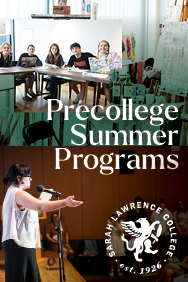David Rubenstein Inspires Service to Country in 23rd Brendan Gill Lecture

Mo Rocca and David Rubenstein. Photo courtesy Bronxville Historical Conservancy
By Ellen de Saint Phalle, Bronxville Historical Conservancy Board Member
May 4, 2022: Approximately 250 people gathered to hear David Rubenstein deliver the 23rd Brendan Gill Lecture on April 29 in the Barbara Walters Campus Center. President Cristle Collins Judd welcomed the Bronxville Historical Conservancy (BHC) membership and friends to the first greater community gathering at the College since 2020.
BHC Co-Chair William Zambelli, in his welcoming remarks, thanked President Judd, his Co-Chair Erin Saluti as well as members of the Conservancy Board for their efforts in making the event possible before turning the podium over to Conservancy Co-Founder and Gill Committee Chair Marilynn Hill who introduced Rubenstein.
Hill highlighted Rubenstein’s many accomplishments as an investor, best-selling author, television host, and most important, his commitment to historic preservation through his patriotic philanthropy. Rubenstein is an original signer of The Giving Pledge, promising to dedicate the majority of his wealth to charitable causes, much of which is related to American History. Hill emphasized the impact of Rubenstein’s transformative gifts on historic preservation including the restoration or repair of the Washington Monument, Lincoln Memorial, Jefferson Memorial, Monticello, Montpelier, Mount Vernon, Arlington House, the Iwo Jima Memorial, the Smithsonian, the Kennedy Center, the National Archives, the Library of Congress, and the National Museum of African American History and Culture. Rubenstein has also provided long term loans of his rare copies of the Magna Carta, the Declaration of Independence, the U.S. Constitution, the Bill of Rights, the Emancipation Proclamation, the 13th Amendment, the first map of the U.S., and the first book printed in the U.S.
Hill praised Rubenstein’s belief in the American Spirit and his service to the country. She noted Rubenstein’s humble beginnings growing up in Baltimore, the impact of Kennedy’s inaugural speech had on him as a young boy and his going on to earn scholarships at Duke University and The University of Chicago Law School. Hill noted, time and again, throughout his extraordinary career, Rubenstein was also recognized for his self-effacing humor.
Rubenstein’s humor was readily apparent when he took the stage, thanking Hill for her thorough introduction, he said, “There’s nothing more to say.” He then asked Hill if he might use her remarks for his obituary or eulogy, before stepping in front of the podium to address the audience directly. He began by acknowledging his admiration for Brendan Gill, a former Bronxville resident, critic and writer for the New Yorker, for whom the lecture series was named. Rubenstein then polled the crowd with questions about where they were from and their general thoughts on the current state of the country and its leadership. His queries were peppered with impressive facts and statistics revealing his investor’s acumen and scholar’s grasp of history as well as an easy and clever sense of humor. He invited the audience to ponder why, when the country’s population has grown by millions is there a dearth of leaders like Washington, Franklin, and Jefferson today, and suggested perhaps those great leaders were in private equity rather than politics.
He affirmed his admiration for John Kennedy, and recounted his vivid memory of going over Kennedy’s speech with his 6th grade teacher the day after the inauguration. “And so, my fellow Americans: ask not what your country can do for you – ask what you can do for your country.” Those words have resonated with him from that day to this. His restoration of so many national monuments, museums, houses and cultural centers and preservation of historic documents is his way of giving back to his country. Philanthropy, Rubenstein, pointed out, does not have to be about money. Volunteering your time and or talents, are also important ways to serve your community.
He shared his admiration for Jackie Kennedy’s efforts not only to restore the White House, but also to make it accessible to all Americans through a walking tour on national television. Rubenstein insisted that seeing historical places and documents in person adds to the experience, usually inspiring research before the viewing, and then, additional reading afterward, making the ultimate experience richer with a deeper grasp of the material than any virtual viewing could.
Rubenstein shared his personal path to philanthropy and emphasized the role serendipity plays in everyone’s life was no different for him. He worked at two law firms, summer interning at Cravath Swain and Moore, and then working for his idol Ted Sorenson at Paul Weiss, before eventually deciding law was not for him, which led to his ill-fated support for Birch Bayh, and then, a position in the Carter White House. When Carter lost to Reagan, Rubenstein spent several months looking for his next job before taking a position at another law firm. Unfulfilled in that job, he recalled reading about William Simon’s leveraged buyout of Gibson Greeting Cards in 1983, and without knowing what a leveraged buyout was, determined “that’s for me.” and set about starting his own investment firm. In 1987,with 5 million dollars from four investors, Rubenstein co- founded The Carlyle Group, which has grown to be one of the world’s largest and most successful private equity investment firms, managing $365 billion from 26 offices around the world.
His successes led Rubenstein to look for opportunities to give back to the country that had been so good to him. He determined four rules for his philanthropy:
1. To start something that wouldn’t otherwise get started,
2. To finish something that would not otherwise get finished,
3. The project must provide an intellectual interest so that he will stay involved, and
4. The project must show progress in his lifetime.
He went on to share a chance invitation from another banker to view the Magna Carta not only led to his viewing the historic document but also his purchasing it at auction the following day. He then loaned that document to the National Archives for public viewing. Rubenstein’s philanthropy stems from his deep love for his country. He emphasized the United States is a leader in philanthropic giving as well as volunteering, and he hoped his efforts would serve to inspire others to give back to their communities as well. Rubenstein concluded his remarks echoing Kennedy’s words:
“With a good conscience our only sure reward, with history the final judge of our deeds, let us go forth to lead the land we love, asking His blessing and His help, but knowing that here on earth God's work must truly be our own.”
After resounding applause, Rubenstein was joined on stage by Emmy Award winning Television correspondent and author Mo Rocca for a brief follow-up conversation. Rocca has interviewed two previous Gill presenters and is himself a member of the Bronxville Historical Conservancy. Rocca asked Rubenstein who he thought was America’s second funniest billionaire? The two entertained a few questions from the audience before concluding the program and joining the audience for a champagne reception.
Government & History Directory
Bronxville is a quaint village (one square mile) located just 16 miles north of midtown Manhattan (roughly 30 minutes on the train) and has a population of approximately 6,500. It is known as a premier community with an excellent public school (K-12) and easy access to Manhattan. Bronxville offers many amenities including an attractive business district, a hospital (Lawrence Hospital), public paddle and tennis courts, fine dining at local restaurants, two private country clubs and a community library.
While the earliest settlers of Bronxville date back to the first half of the 18th century, the history of the modern suburb of Bronxville began in 1890 when William Van Duzer Lawrence purchased a farm and commissioned the architect, William A. Bates, to design a planned community of houses for well-known artists and professionals that became a thriving art colony. This community, now called Lawrence Park, is listed on the National register of Historic Places and many of the homes still have artists’ studios. A neighborhood association within Lawrence Park called “The Hilltop Association” keeps this heritage alive with art shows and other events for neighbors.
Bronxville offers many charming neighborhoods as well as a variety of living options for residents including single family homes, town houses, cooperatives and condominiums. One of the chief benefits of living in “the village” is that your children can attend the Bronxville School.
The Bronxville postal zone (10708, known as “Bronxville PO”) includes the village of Bronxville as well as the Chester Heights section of Eastchester, parts of Tuckahoe and the Lawrence Park West, Cedar Knolls, Armour Villa and Longvale sections of Yonkers. Many of these areas have their own distinct character. For instance, the Armour Villa section has many historic homes and even has its own newsletter called “The Villa Voice” which reports on neighborhood news.
Link to Village of Bronxville One Square Mile Monthly Newsletter
Village of Bronxville Administrative Offices
337-6500
Open 9:00am - 4pm excluding holidays and weekends
Bronxville Police Department
337-0500
Open 24 hours
Bronxville Parking Violations
337-2024
Open 9:00am - 4pm excluding holidays and weekends
Bronxville Fire Deparment
793-6400















